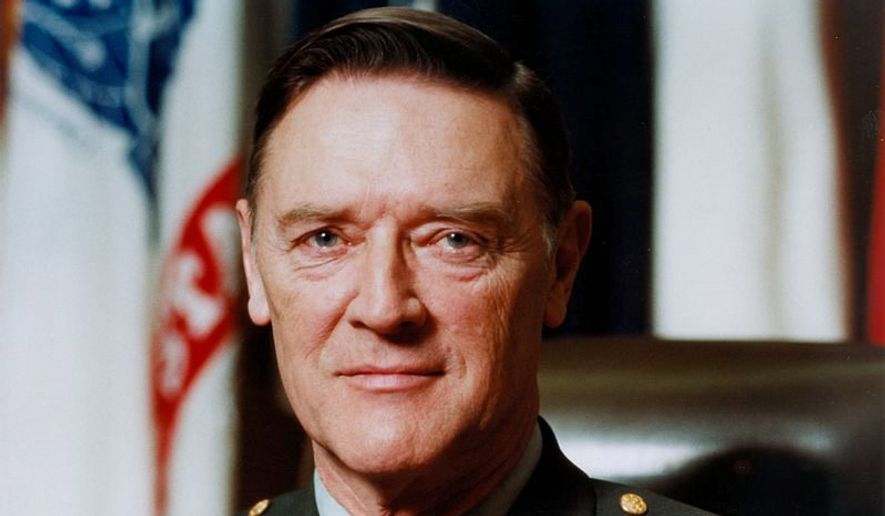Gen. Frederick Kroesen was the consummate soldier, from the top of his steel pot helmet to the soles of his jump boots.
He battled his way through France and Germany as an infantry company commander during World War II only to find himself again facing death almost four decades later in an assassination attempt while serving as the Army’s top officer in Europe.
A highly-decorated infantryman, Gen. Kroesen was most proud of his Combat Infantryman Badge with two stars, denoting active combat in World War II, Korea and Vietnam.
“He was a totally dedicated man — to his country, to his job and, of course, to his family,” said his son, Frederick Kroesen III. “He was always the military man. He was a soldier who lived his life as a soldier.”
Gen. Kroesen died Apr. 30 at his home in Alexandria, Virginia. He was 97.
A New Jersey native, he graduated from Rutgers University before starting a military career that eventually made him the first ever person commissioned through Officers Candidate School to wear four stars on his uniform.
During World War II, he saw heavy combat as a platoon leader then company commander. He remained in the Army after the war, becoming a battalion commander in the Korean conflict and later a brigade and division commander in Vietnam.
“But when he wasn’t out fighting in the wars, he was home being ’Dad,’” his son recalled.
Growing up in the Kroesen house meant learning to respect the flag, obey one’s elders and say “Yessir” or “Yes, ma’am” when told by parents to do something.
“Duty, honor and country were grilled into us,” Mr. Kroesen said. “You had to shape up or ship out.”
But father and son bonded over a mutual love for sports. A natural athlete, Gen. Kroesen rowed crew at Rutgers and was an avid baseball fan. He taught his children how to play everything from ping pong to golf.
“Sports was our greatest time together,” Mr. Kroesen, the son, said, recalling how he headed off to college about the same time his father deployed to Vietnam.
It was a time of great societal conflict and Mr. Kroesen sometimes asked his father pointed questions about the war. “I didn’t appreciate the depth and seriousness of what he was involved in until much later. I started hearing stories from others about his command of the 196th Light Infantry Brigade and the vicious battles they were involved in,” Mr. Kroesen recalled. “I was completely obvious to all that.”
Gen. Kroesen’s military career continued flourishing after Vietnam. He held a number of high-profile positions, including serving as commanding general of the famed 82nd Airborne Division.
Retired Gen. Carter Ham, president of the Association of the U.S. Army, was a junior enlisted soldier in the 82nd when he met then-Maj. Gen. Kroesen.
“I recall with great clarity the occasions I met him. He had that effect on people,” Gen. Ham said in a statement. “He was wise, caring, unselfish — one of the Army’s great leaders. I will miss him. We all miss him.”
After a tour in the Pentagon as the Army’s Vice Chief of Staff, Gen. Kroesen went to West Germany as commander of U.S. Army — Europe.
The general’s son recalled being at his parents home in Heidelberg in September 1981 when an MP officer told him there had been an attack on his father. Gen. Kroesen was being driven to a meeting in his armored Mercedes-Benz when a pair of rocket-propelled grenades were fired at the car from a nearby hillside.
Also in the car was the general’s wife, Rowene Kroesen, who was on her way to a dental appointment.
One of the grenades ripped into the vehicle’s trunk and blew out the back window. Several gunshots reportedly also were fired at the car.
Mr. Kroesen recalled that his parents survived and were quickly checked out of the hospital. “They patched up his neck and he headed straight out to work. He just went about this business,” the son said of his father. “Mom did the same. She went to her dentist appointment.”
An investigation later revealed the assailants were members of the pro-Soviet Red Army Faction — the Badder-Meinhof gang.
In a later interview, Gen. Kroesen said he was glad the terrorists had fired Soviet weapons rather than American ones. “’I wouldn’t be standing here’ — that was one of his quotes, word-for-word,” the general’s son recalled.
Gen. Kroesen entered business after retiring from the Army in 1983. He was active in the Association of the U.S. Army and occasionally wrote, including for The Washington Times.
His family said Gen. Kroesen will be buried in Arlington National Cemetery, although final details are still pending because of the coronavirus pandemic. “They’ve informed us that the burial can’t occur for at least three months because of the backlog,” Mr. Kroesen said.
Gen. Frederick Kroesen, Jr., is survived by Rowene, his high school sweetheart and wife of 76 years; three children; 10 grandchildren; 23 great-grandchildren and “Baby Fritz,” his great-great grandson.
• Mike Glenn can be reached at mglenn@washingtontimes.com.




Please read our comment policy before commenting.